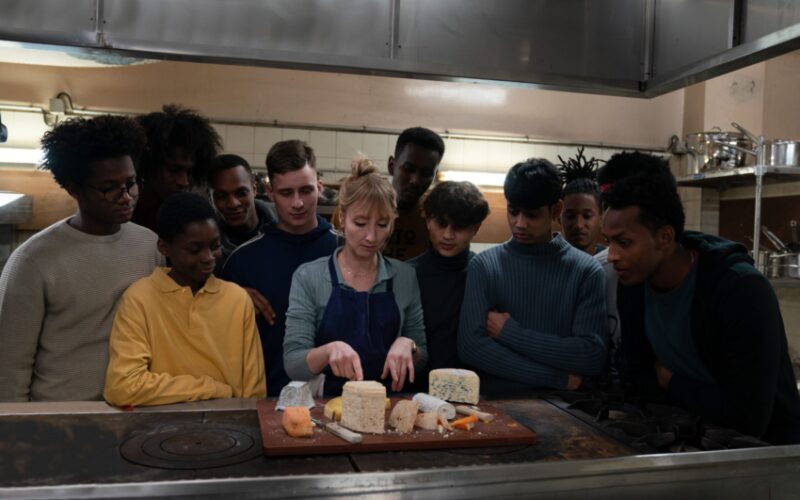Kitchen Brigade (Petit, 2023)
There is a stage-setting scene at the beginning of Kitchen Brigade in which sous chef Cathy Marie (Audrey Lamy) clashes with her celebrity chef boss about what seasoning will elevate a good dish into a great one.
Like many scenes in the film, it is not particularly subtle, but it is well-executed. It is the first of many scenes that is almost metafictive. The way the film itself is structured reinforces the lessons about food and life that the content emphasizes. The right emphasis can elevate a film just as much as a desert.
I am tempted to call Kitchen Brigade a fusion film. In cuisine, that means bringing together ingredients and recipes from different cultures or styles. Parts of Kitchen Brigade are rote underdog narrative. Cathy quits her job and ends up running a cafeteria for unaccompanied minor refugees. They just want to play soccer and eat ravioli drenched in too much tomato sauce. Think she can teach them a few life lessons by injecting the demands of the kitchen into their drab shelter? If you don’t you’ve never seen Dangerous Minds or Stand and Deliver or Dead Poets Society or Chef or…much of anything.
But the film is also infused with a European aesthetic. There are scenes, such as a montage of the refugees getting bone scans to determine their age, that would not seem out of place in a Dardennes film or some other neorealist descendent. In these scenes, the film stops simply advancing the plot and invites us to linger over small bites and appreciate straightforward emotions as much as razzle-dazzle.
When the third act has Cathy grudgingly accept a long-scorned invitation to appear as a contestant on her former boss’ chef-duel show, we anticipate a bloated Marvel-style showdown where everything is resolved by being victorious at the climactic competition. And then the film smartly and surprisingly elides nearly all of the competition, opting instead to tell a fuller more powerful story through the look on Cathy’s face when she goes to the audition or arrives back from a semi-final victory to a demonstration of how much she has come to mean to the community that she no longer serves but also identifies with and represents.
They say that one of the hardest culinary challenges that distinguish top-tier chefs from those closer to average is making a seemingly plain consommé. Louis-Julien Petit has nailed the cinematic equivalent, executing to perfection a film that may outwardly look simple but which satisfies those with a refined palette by giving them a variety of subtle moments. It is remarkably confident direction and sent me looking for some of his earlier work. His earlier films are woven together by an overt social and class consciousness, yet they have more hope than one is used to seeing in this cinematic genre. When you don’t have much — as an artist or a consumer — you learn to appreciate small things done well.

